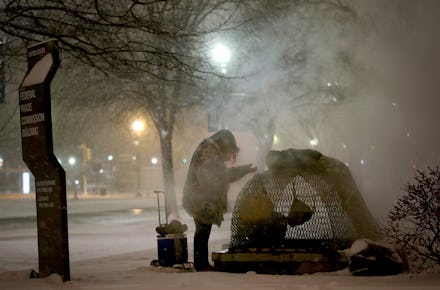Wanda Witter, homeless for over a decade, will receive $100,000 in owed Social Security

Wanda Witter, a homeless woman living in Washington, D.C., spent 10 years trying to prove to Social Security officials that she is owed more than $100,000 in back payments. On Tuesday, she finally received a check from the government for $99,999, the Washington Post reported.
According to the Post, the now-80-year-old Wanda Witter moved to D.C. in 1999 after losing a machinist position in New York. She began receiving Social Security benefits in 2006, only to find her the amount on her checks would vary greatly from month to month. Witter, knowing something was wrong with the checks, wrote "Void" on each one and returned them. The resulting financial difficulties caused her to move into a shelter, and Witter began living on the street.
"They kept thinking I was crazy, telling me to get rid of the suitcases," Witter told the Post. "... I knew, when I committed to homelessness, I had to be very careful about what I did. 'Don't do anything stupid,' I told myself. Because they'll think I'm a mental case."
It took her over a decade, during which she safeguarded several pieces of luggage holding years of paperwork, to find someone that was willing to listen. In 2015, she found social worker Julie Turner, who listened to her story and looked through the paperwork herself, then referred Witter to a lawyer named Daniela de la Piedra. In June, the Social Security Administration admitted something was off, and after the issue was investigated and paperwork was processed, Witter received a check for $99,999.
Homeless people face extensive social stigma of the kind which contributed to Witter's story going unheard for years, Mic's Zeeshan Aleem reported in 2015.
"About 610,000 people are homeless on any given night in the United States," Aleem wrote. "Roughly one-third of them spend their nights on the street, unable or unwilling to take refuge in shelters. The unsheltered homeless are a particularly vulnerable group, prone to suffering from the elements, harassment and violence."
In 2014, a study by University of North Carolina Charlotte researchers concluded simply giving homeless people adequate housing and resources saves significantly more money than it costs. A $6 million facility providing 85 units for people without other housing produced first-year savings "including $1.8 million in health care savings from 447 fewer ER visits (78% reduction) and 372 fewer hospital days (79% reduction). Tenants also spent 84 fewer days in jail, with a 72% drop in arrests."
According to the Charlotte Post, that program was "controversial, if not ridiculed" before it began.